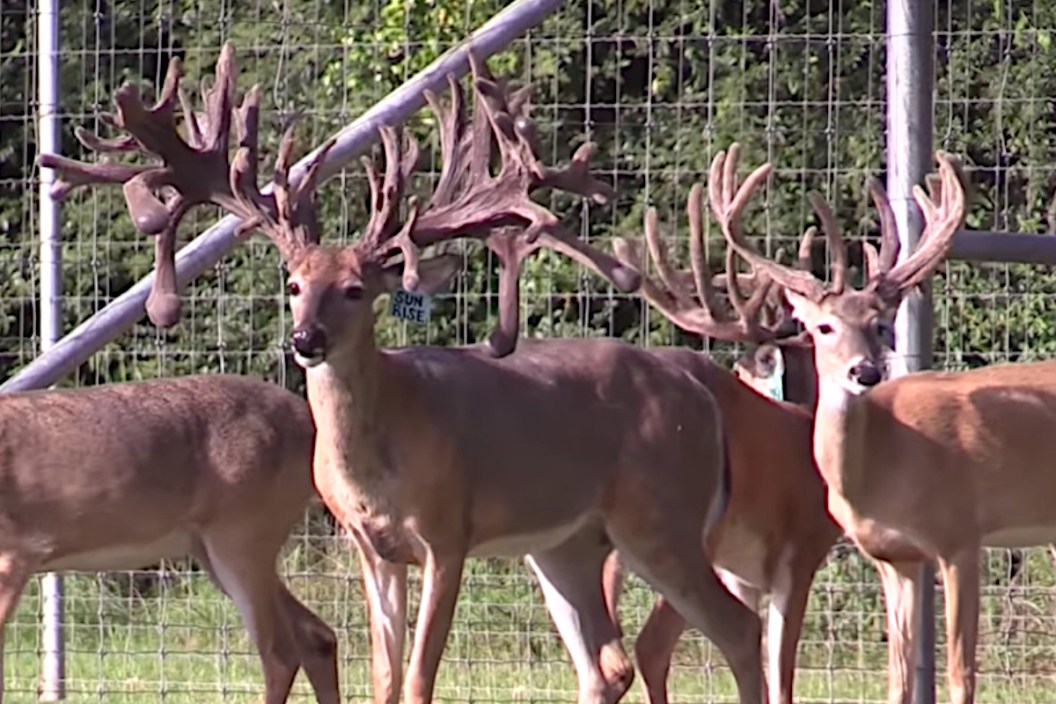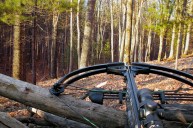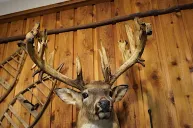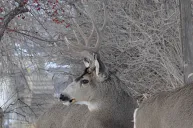Is high fence hunting a great business move?
Just saying the words "high fence operations" is enough to set most any dedicated gun or bowhunter off. High fenced hunting areas are the subject of near endless debate as hunters debate exactly what constitutes fair chase hunting.
But is a quality hunting ranch with canned hunts actually a brilliant business idea?
Well, let's discuss it, and the place these type of operations have in the world of hunting, if any.
"Livestock"
It is hard to dig up the history of high fence hunting operations. From what I can tell, canned big game hunting operations on high fence properties have existed since at least the 1960s. I do know that the first experiments manipulating the genetic traits of whitetail deer to produce trophy bucks happened sometime in the 1970s. It seems it all started with trophy whitetail hunts, and then spiraled out of control to other species like elk, hog, fallow deer, aoudad, blackbuck, and other exotic hunts from there.
Whatever the case may be, it's been going on for a long time. Long enough that we know how profitable it is for the owners. In college I interviewed the owner of one of these facilities here in Michigan. The man was a lawyer by profession. That was obvious within moments of our conversation starting because he was a slick, fast talker. While being a lawyer was his primary job, his side business was a high fence deer ranch that also specialized in exotic big game like wild boars.
In fact, the guy was gearing up for a major legal battle with the state of Michigan over the future of these types of hunting operations. The state was worried about getting a hog problem like Texas. But the owners of these types of ranches had a LOT of money invested in them and didn't want to let that go without a fight.
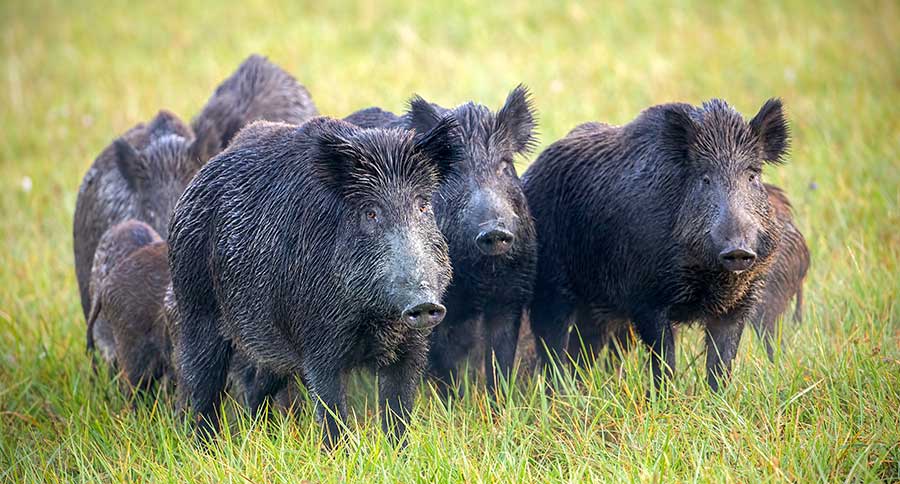
There is one thing I'll never forget from that conversation I had with him as we discussed hogs behind high fences. He told me: "The pigs on my ranch are no different than a pink pig on a farm."
Basically, this owner was telling me these weren't wild animals. They were livestock. He was actively fighting to have them designated as such as far as the laws were concerned. That has stuck with me over the years. That livestock designation is something many of these deer hunting ranches seek. So, for the sake of this article, let's not pretend these operations are working with "free range" animals, no matter how large their fenced-in area is. If the animal can't freely leave the property (such as on a low fence ranch) they aren't wild animals.
Basically, it's hunting a zoo. There's little to no chance you won't see a shot opportunity at an animal of the likes you'll never again see in a lifetime. How did this ever gain traction as a business idea?
Money talks
So, are high fence operations a great business idea? Technically, yes. I looked at several high fence "hunting experience" websites while researching this article. One of the sites I looked at had their "cull" hunts for bucks up to 139 inches priced in the $1,200 to $3,500 range. That's for one deer. On the opposite end of that scale, hunts for bucks 200 inches and up were priced at nearly $8,000. That's on the low end of these operations. The bigger the high fence ranch, and the bigger the deer, the higher the price.
For many places, if the buck scored over 226 inches, the price was nearly $10,000, plus an additional $150 for each inch of antler past that. Think about that, $150 an inch! That means that anyone who shoots a 300-inch whitetail at this facility is out a cool $20,000, at least.
Another operation I looked at charges around $6,500 for a mature elk bull scoring 350 inches or more. Going back to the exotic swine again for a moment, one Missouri operation I looked up charges $1,000 a day to go after a boar up to 300 pounds. Another place I looked at in Texas only charged $400 a day, but that's still a lot of money just to bring someone on your property, point at a pig, and let them shoot it. I don't know about you, but as a simple outdoor writer, this kind of thing is way out of my price range. I'll take my chances with a public land deer hunt. My odds may be astronomically low on an archery hunt during the elk rut on public lands without an outfitter, but at least I can afford it.
So, technically speaking, yes, high fence operations are great business. But only for their owners. These places wouldn't be everywhere if they weren't. There is a lot of money to be made each hunting season. It is little wonder the owner of these operations fight state agencies tooth and nail to try and preserve them. Of course, other than being legal, the other question is: "Are they ethical?" Well, that seems to depend on who you speak to.
Giving the customers what they want
At some point someone fenced in some deer and someone else paid them to go in and shoot them. In a way, I can't blame the owner, intentional or not. Someone waved money in their face and they didn't have to work for it. They probably thought they were just giving deer hunters what they wanted.
Let's face it, we've been conditioned to want this. All the whitetail deer hunting TV shows emphasize the harvest and trophy whitetail bucks and other big game. We're our own worst enemy in this regard. We can't accept defeat.
This is why so many of these operations advertise a "100% success rate or your money back."
Given how many poachers don't bat an eye over their crimes and bragging about the deer they stole, it's little wonder some hunters have no problem referring to a canned shoot of a 200-inch deer as a "whitetail hunt."
The American way has always been about giving the people what they want. Sadly, what too many rich "hunters" want is a shortcut without the hard work of bagging a wild animal themselves.
So, in that sense, it actually is a brilliant business idea.
Ethically speaking
Those two points being said, ethically speaking, high fence hunting preserves SHOULD be a terrible business idea, for many reasons. But the biggest is the diseases that are cultivated and spread within them.
Let's use Wisconsin as an example. In recent years, multiple facilities have tested positive for chronic wasting disease or CWD.
Several years ago, a new CWD containment area was opened up in Oneida County, Wisconsin as a result of a buck testing positive for the disease in a high fence operation called Three Lakes Trophy Ranch. That meant hunters of wild game were now subject to immediate baiting bans and carcass movement restrictions in a three-county area nearest the ranch, even though they had nothing to do with the place.
That ranch is still in operation and charging anywhere from $5000-10,000 a deer, plus a $2,000 deposit, according to their website. As you might imagine, some locals were quite upset that they were being hit with new regulations while this place was still making money off the penned deer.
It's not just the hunting operations making tons of money either, but the farms that help supply the animals for this kind of thing. Sometimes, they also have escapes that can introduce potential problems to nature. In 2016, an Eau Claire County Farm called Fairchild Whitetails had 33 animals escape their facility. Two of them were CWD-positive and spent months outside the fence, possibly spreading the disease to the wild herd. Authorities quickly swept in and euthanized all the deer in the facility, but there's another kick in the teeth to this story for Wisconsin hunters.
The state reimbursed the owner nearly $300,000 for the captive herd after the fact. Yep, if you're a Wisconsin taxpayer in Eau Claire, Clark or Jackson County, your dollars went to reimbursing the people responsible for the CWD-containment zone in your area in the first place.
It all makes me wonder about the business associations these places have. What insurance agency looks at a high-risk place that hosts hunts and has no problems covering them? What veterinarian is okay with a place that raises animals to be shot like this?
All that, and many will still claim these places screw up things for hunters after wild animals. They're putting wild herds at risk of disease. When these places mess up, they get bailed out by state agencies instead of punished. Ethically, this should be one of the worst businesses one could start up.
A bad look for hunting
It's hard to get into the highly questionable ethics of pumping animals full of unnatural growth hormones. You can look at what the record keepers like Boone & Crockett think about high fence canned hunts. B&C is against them for the same reason I am. It comes down to fair chase.
At the end of the day, we are basically talking about animals confined to a cage. They may eat natural food plots that grow there regardless of fences, but they can't escape. Many purist hunters, myself included, look at hunting ranches as places designed for some dude who can't hunt, in need of something to brag about to his buddies. If you read up a little on the clients of these places, you'll unearth a lot of interesting stories from guides about people who only cared how many inches SCI their trophy animal would score.
Most of the people who buy domestic or exotic species at these places don't seem to care about the experience of the hunt. They don't care about fair chase, or disease, or how the operation may affect local hunters. They certainly don't care about how it makes hunting look overall.
I've written in the past on how hunting is slowly dying out. Yes, I said it. You know it, and I know it. Hunting is dying and no one wants to admit it out loud. In fact, I'd argue, by allowing businesses like high fence hunts to continue, we're fast-tracking things even more. The average non-hunter who has no opinion on hunting is very likely to have a negative view of this so-called canned hunting.
All it takes is just one controversy at one of these operations to open the flood gates. We've seen it with the Cecil the Lion incident years ago. Overnight, a whole bunch of new anti-hunters were born. How long until something happens at one of these places to further soil the name of hunters everywhere?
"The conservation of natural resources is the fundamental problem. Unless we solve that problem it will avail us little to solve all others," - Teddy Roosevelt, 1907.
Roosevelt didn't live long enough to see canned hunts. It's a shame really. I would have loved to know what he would have had to say on the matter. But he did understand how important conservation is, and that's what he's talking about in that quote.
At the end of the day, we as hunters always refer to ourselves as conservationists. But to those who support high fence operations as a business idea, I have a question. What do these places do for conservation here in America other than tarnish the reputations and idea of hunters as conservationists?
These businesses are a great idea all right. One that ONLY benefits the bank accounts of owners and deer breeders. Think on that before you give one of these "businesses" your hard-earned dollars.
For more outdoor content from Travis Smola, be sure to follow him on Twitter and check out his Geocaching and Outdoors with Travis Youtube channels.
NEXT: BEYOND MEAT: HOW THE PLANT-BASED FOOD INDUSTRY COULD AFFECT WILD GAME CONSUMPTION AND HUNTING
WATCH: TELLING THE HUNTING STORY MIGHT JUST SAVE IT
